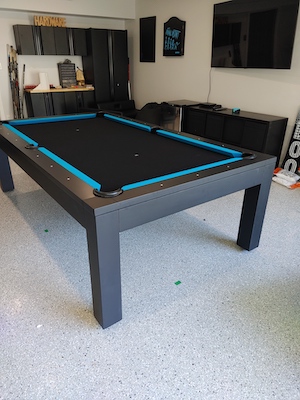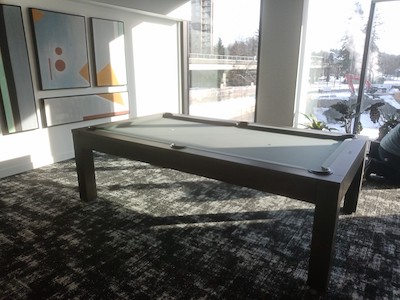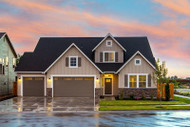Wait! Read This Before Putting a Pool Table in Your Garage
Posted by Home Billiards on 17th Oct 2023
What to Know About Putting a Pool Table In Your Garage
Considering putting a pool table in your garage?
Whether you’ve already made the purchase or are still hovering over the buy button, there are some important details you should know about garage pool tables—details that can make or break your experience.
Read below for everything you need to set yourself up for success.
Key takeaways: TL;DR
- Maintain a stable room temperature in your garage (no less than 60°F / 15°C) to preserve your pool table and ensure player comfort.
- Keep the humidity level within the range of 40-60% to maintain the table's health, gameplay quality, and overall comfort.
- Opt for a slate pool table for your garage, as it is durable, resistant to temperature and humidity effects, and offers a smooth playing surface.
- Consider using dehumidifiers for high-humidity areas, portable A/C or fans for hot weather, and room heaters for colder months in your garage.
- Insulate your garage with proper wall insulation and high-efficiency windows and doors to regulate the temperature.
- Place a small carpet or rug under the pool table to insulate it from the ground, prevent scratches, and enhance stability, especially on concrete floors prone to sweating.
Does temperature affect pool tables?
One factor to consider before putting a pool table in your garage is temperature.
Too cold or too hot of a temperature can negatively affect your table, as can fluctuations in temperature.
Cold temperatures can hurt your pool table by decreasing the amount of moisture content, which can cause wood to contract, and hot temperatures can cause too much moisture, which can cause wood to swell.
Both scenarios—especially constant back and forth between hot and cold temperatures— can lead to load-bearing parts of your table shifting, jeopardising the structural integrity of your table over time.
A good rule of thumb is to keep your garage as close to room temperature as you can, and no less than 60°F / 15°C.
This will not only help preserve the life of your table but also keep your garage at a comfortable temperature for you and any other players.
Will humidity ruin a pool table?
More than temperature, humidity is an important factor to consider.
For one, humidity caused by warmer temperatures can lead to mould, mildew, and—in extreme cases with wooden tables—rot.
Even with higher-quality slate tables, which are more resistant to temperature effects, warmer temperatures—especially after a quick shift from colder temperatures—can cause the slate to “sweat”.
While this isn’t necessarily damaging to your table, it does affect playability. This “sweat” puts more moisture into the pool table felt, which causes balls to roll slower, meaning you’ll need to put more power into your shots.
In fact, moisture affects gameplay in all sorts of ways. Take cue handling, as an example: handling your cue with completely dry hands is very different than with sweaty hands caused by air-borne moisture.
A safe level of humidity for the health of your table, the quality of your play, and general comfortability is anywhere in the range of 40-60%, depending on your preference.
What is the best pool table for a garage?
By far, the best pool table for a garage is a slate pool table that is designed as an outdoor pool table.
Made of a rock-like material typically made from clay, quartz, and sand, slate is considered the highest-quality tabletop material available.

Alt: A black and blue pool table on a cement floor in a room with a TV on the wall.
It’s specifically ideal for a garage because of its dense playing surface and high durability, making it virtually impervious to temperature and humidity effects and more resistant to damage from everyday use around the garage.
While not specific to garage play, slate also offers a smooth-as-glass playing surface, smoother than what you’ll find on synthetic and wooden tables.
Learn where to buy a pool table for your needs.
Tips for keeping a pool table in the garage
Pulling from the information above, let’s look at some tips to help you get the most out of your garage-playing experience.
Humidifier for humid places
If you live in an area where humidity is an issue, a dehumidifier might be all you need—and maybe only for a specific time of the year. For help choosing a dehumidifier strong enough for your garage, refer to the guidelines set by Natural Resources Canada (NRC).
Add A/C or fan for hot places
During hotter weather, a portable A/C system in your garage can go a long way in keeping your garage cool enough for your pool table. If A/C isn’t an option, a strong fan can work, too.
Room heater in colder months
If frigid temperatures are more your concern, a heater is an easy, affordable way to keep your garage at a comfortably warm temperature.
Add insulation and high-efficiency windows and doors
Heaters and A/C units can only do so much if your garage isn’t insulated enough to keep inside heat in and outside heat out.

This is where wall insulations and high-efficiency windows and doors help. With proper insulation and sealing through your garage, you won’t suffer as much temperature leakage and have an easier time keeping the barometer constant.
Add carpet
Now, you’re likely not about to go out and lay down carpeting across your whole garage. But carpeting is actually one of the best flooring options for a pool table.
A small carpet (or rug) under your pool table can help insulate your table from the ground, prevent scratches caused by being on a hard floor, and make your table more stable (especially if it’s on a concrete floor prone to sweating in warmer weather).
Garage pool table FAQs
Can I install a pool table in an unheated garage during the winter months?
You can install a pool table in a garage during the winter months, as long as you account for the potential impact of cold temperatures on the table. Cold temperatures can cause wood to contract due to decreased moisture content, which can affect the structural integrity of the table over time. Consider using a room heater to maintain a minimum temperature of 60°F / 15°C, installing proper installation and sealing, and avoiding drastic temperature fluctuations as best you can.
Here are more tips for installing a pool table the right way.
Are there any special considerations for garage pool tables in regions with extreme climate variations?
In regions with extreme climate variations, choose a pool table more resistant to temperature and humidity effects, such as slate. Consider also using climate control equipment, such as heaters and dehumidifiers, to maintain stable temperature and humidity levels. Additionally, insulation, high-efficiency windows, and doors can help regulate the climate inside the garage, reducing the impact of extreme temperature fluctuations.
How do I protect my garage pool table from dust, debris, and other environmental factors?
To protect your garage pool table from dust, debris, and other environmental factors, follow these steps:
- Cover your pool table with a fitted pool table cover when it's not in use to prevent dust and debris from settling on the playing surface.
- Use a small carpet or rug underneath the table to insulate it from the ground and reduce the risk of scratches if your garage has a hard or concrete floor.
- Regularly clean and dust the pool table, rails, and pockets using a soft, lint-free cloth.
- Keep the garage area clean to minimise the amount of dust and debris in the environment.
- Consider using an air purifier or ventilation system to improve air quality in the garage and reduce airborne particles.
Wrapping up
If there are three things to walk away from this guide with to set your garage pool table up for success, they are: room temperature, low humidity, and slate pool tables.
For help with this last one, check out our guide on buying a pool table.

